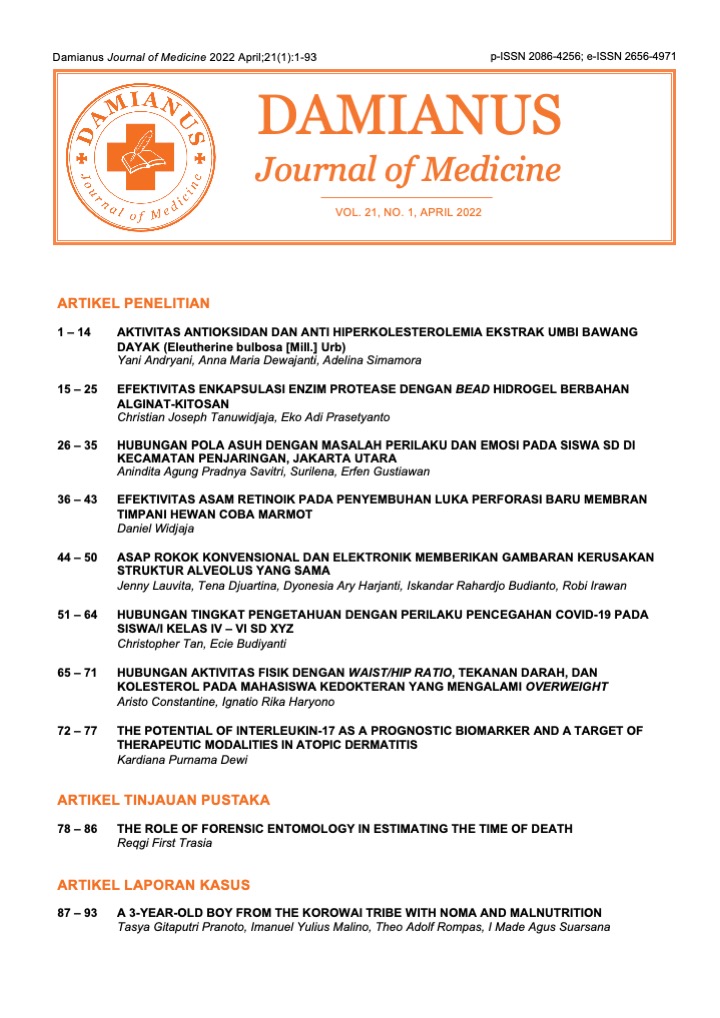HUBUNGAN POLA ASUH DENGAN MASALAH PERILAKU DAN EMOSI PADA SISWA SEKOLAH DASAR DI KECAMATAN PENJARINGAN, JAKARTA UTARA
DOI:
https://doi.org/10.25170/djm.v21i1.1919Keywords:
Parenting, behavioral and emotional disorder, children, elementary school, Pola asuh, masalah perilaku dan emosi, anak, sekolah dasarAbstract
Background: Parenting is defined as an act of giving education, guidance, patronage, and supervision by the parents to their children. Different methods of parenting may result in distinctive character developments as well as determining the children's behaviour and emotional demeanour. Objective: To determine the relationship between parenting towards behavioral and emotional problems among primary school student in Penjaringan, North Jakarta. Methods: This study was a cross-sectional study of 512 primary school students in Penjaringan, North Jakarta. Measuring instruments used were Strength and Difficulties Questionnaire (SDQ) dan Parenting Questionnaire Children’s Point of View. Both instruments were filled directly by students. Data analysis was performed descriptively and bivariate (chi-square). Result: There were 32% respondents with behavioral and emotional problems, among them 38.5% conduct problems; 34.2% peer problems; 25% emotional symptoms. This study finds that 66.2% respondents with Exposure parenting, among them 51.8% with type B parenting (authoritarian), 7.6% with type D parenting (Inconsistent), and 6.8% type C parenting (Permissive). Bivariate analysis found that there is significant relationship between parenting towards behavioral and emotional problems (p<0.05; 95%CI = 0.448 – 0.970; OR = 0.659). Conclusion: There is association between parenting towards behavioral and emotional problems among primary school students.
Keywords: Parenting, behavioral and emotional disorder, children, elementary school
Downloads
References
2. Baharun, H. . Pendidikan Anak Dalam Keluarga; Telaah Epistemologis. PEDAGOGIK: Jurnal Pendidikan. 2016. 3(2) Hal.96.
3. Rakhmawati I. Rakhmawati , Istina. Peran Keluarga Dalam Pengasuhan Anak. Konseling Religi Jurnal Bimbingan Konseling Islam, 6(1) p. 1-18, 2015.
4. Fataruba, R., Purwatiningsih, S., & Wardani, Y. Hubungan pola asuh dengan kejadian kekerasan terhadap anak usia sekolah (6-18 tahun) di kelurahan Dufa-Dufa kecamatan Ternate Utara. Kes Mas: Jurnal Fakultas Kesehatan Masyarakat Universitas Ahmad Dahlan. 2009. 3(3).
5. Ekosiswoyo, R., Joko, T., et.al. Potensi Keluarga Dalam Pendidikan Holistik Berbasis Karakter pada Anak Usia Dini. 2016. 1(1): Hal 1-3.
6. Rostiana, I., Wilodat, W., Alya, M. N. . Hubungan Pola Asuh Orang Tua dengan Motivasi Anak Untuk Bersekolah di Kelurahan Sukagalih Kecamatan Sukajadi Kota Bandung. Jurnal Sosietas, 5(2). 2015.
7. Sanubari WB, Dr. Erna Herawati SKJ. Hubungan Pola Asuh dengan Masalah Emosi dan Perilaku pada Anak di SD Negeri Pajang 1 Surakarta. Universitas Muhammadiyah Surakarta; 2017
8. Wiguna T, Manengkei PSK, Pamela C, Rheza AM, Hapsari WA. Masalah Emosi dan Perilaku pada Anak dan Remaja di Poliklinik Jiwa Anak dan Remaja RSUPN dr. Ciptomangunkusumo (RSCM), Jakarta. Sari Pediatri. 2016 Nov 18;12(4):270–7.
9. Data Pokok Pendidikan Dasar dan Menengah Kementrian Pendidikan dan Kebudayaan Republik Indonesia Tahun 2019.
10. Idris, Idayu Badilla. Emotional And Behavioural Problems Among Children: Issues and trends in Malaysia. International Journal of Public Health Research, 7.2: 829-835. 2017.
11. Umami, Raisatul; Turnip, Sherly S. Emotional and behavioral problems among left-behind children in Indonesia. Indian journal of psychological medicine, 41.3: 240, 2019.
12. Harahap, Dwi Fachri, et al. Identification of emotional and behavior problems in obese children using Child Behavior Checklist (CBCL) and 17-items Pediatric Symptom Checklist (PSC-17). Paediatrica Indonesiana,50.1: 42-8, 2010.
13. Hidayati, Nur Istiqomah. “Pola Asuh Otoriter Orang Tua, Kecerdasan Emosi, dan Kemandirian Anak SD.” Persona: Jurnal Psikologi Indonesia 3.01 (2014).
14. Wahyuni, A. S., Siahaan, F. B., Arfa, M., Alona, I., & Nerdy, N. The Relationship between the Duration of Playing Gadget and Mental Emotional State of Elementary School Students. Open Access Maced J Med Sci. Jan 15; 7 (1): 148-151. 2019.
15. Ogundele, M. O. Behavioural and emotional disorders in childhood: A brief overview for paediatricians. World journal of clinical pediatrics, 7(1), 9. 2018.
16. Saputra F, Yunibhand J, Sukratul S. Relationship between personal, maternal, and familial factors with mental health problems in school-aged children in Aceh province, Indonesia. Asian J Psychiatry. 2017;25:207–12.
17. León-del-Barco, B., Mendo-Lázaro, S., Polo-del-Río, M. I., & López-Ramos, V. M. Parental psychological control and emotional and behavioral disorders among Spanish adolescents. International journal of environmental research and public health, 16(3), 507. 2019.
18. Duncombe, M.E., Havighurst, S.S., Holland, K.A. et al. The Contribution of Parenting Practices and Parent Emotion Factors in Children at Risk for Disruptive Behavior Disorders. 43(5), 715–733 2012.
19. Jabeen, F., Anis-ul-Haque, M., & Riaz, M. N. Parenting styles as predictors of emotion regulation among adolescents. Pakistan Journal of Psychological Research, 28(1). 2013.














